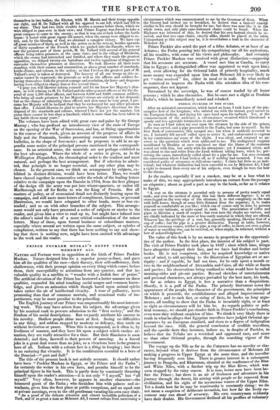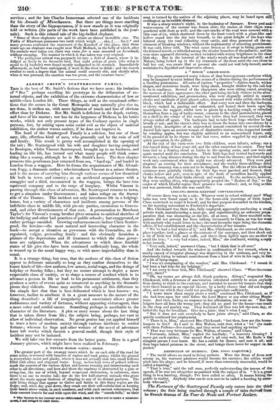PRINCE PUCKLER MUSKAU'S EGYPT UNDER MEHEMET ALL NATURE and Fortune
were in opposition at the birth of Prince Puckler Muskau. Nature designed him for a superior penny-a-liner, and gave him all the qualities of the race—their fluency, their self-sufficiency, their shallowness, with their prompt opinion on every thing which comes before them, their suse,eptibility to attentions from any quarter, and that in- valuable quality in a satellite to "wonder with a foolish face of praise." The artificial elevation of the Prince has bestowed a better manner on these qualifies, expanded his mind touching social usages and common know- ledge, and given an animation which though based upon animal spirits takes rather the air of intellectual vivacity. A tone of gallantry, more presuming than that of common mortals, and occasional traits of im- pertinence, may be more peculiar to the princeling.
The English journey of our Prince was unquestionably his most interest- ing work. This may have arisen from his subject, the advantage given by his nominal rank to procure admission to the "first society," and the freedom of his social descriptions. But we partly attribute his success to his novelty. Shallow people shine most at first. Seeing no difficulties in any thing, and seldom stopped by modesty or delicacy, they rattle on without hesitation or pause. When this is accompanied, as it often is, by liveliness of manner, and they have hit upon a subject which excites at- tention, they are really attractive for a time. But their flimsiness is soon detected ; and then, farewell to their powers of amusing. As a forced joke is a great deal worse than no joke, so a vivacious bore is the greatest bore of all. Tedium with a solemn face is a thing in keeping ; but there is no enduring fiat vivacity. It is the combination essential to a hero of the Dunciad—" pert and dull."
The title of the present book is not strictly accurate. It should rather have been "Puckler Muskau in Egypt, or the Prince and the Pasha" ; for certainly the writer is his own hero, and permits himself to be the principal figure in his book. This is partly done by constantly thrusting himself upon the reader's attention—it is not only "I mysel4" but "all myself." Very often, however, Ile appears in another character—the honoured guest of the Pasha ; who furnishes him with palaces and at- tendants, gives him the first place at public receptions, and an equal seat at private meetings, even to the old gentleman vacating his own easy chair.
"As a proof of the delicate attention and almost incredible politeness of a Turk, and of so great a man as Mehemet Ali,I cannot refrain from mentioning a circumstance which was communicated to me by the Governor of Siout. When the Viceroy had invited me to breakfast, he desired that a fauteuil exactly similar to his own should be brought for me; but there was none like it in the whole town, and only plain cane-bottomed chairs could be found. When his Highness was informed of this, he desired that his own fauteuil should be re- moved, and that two cane chairs, exactly alike, should be placed at the tables Unimportant as this subject may be, it is nevertheless a trait in the character of Mehemet Ali."
Prince Puckler also acted the part of a fidus Achates, or at least of an Achates ; the Pasha pouring into his sympathizing ear all his aspirations, all his troubles, with some of his Niews and philosophy. And certainly- Prince Puckler Muskau was received with great distinction—supposing that his accounts are accurate. A vessel met him at Candle, to carry him to Egypt; a distinguished officer was appointed to wait upon him; and, even allowing for the Oriental habit of princely hospitality, much more money was expended upon him than Mehemet All is ever likely to get "value received" for either in meal or in malt. By what method he contrived to impress the Pasha with this mistaken idea of his con- sequence, does not appear.
Patronized by the sovereign, he was of course tended by all lesser persons ; which he also chronicles. But he once met a slight at Ibrahim Pasha's, which he immediately noted and rebuked.
PRINCE PUCKLER IN THE SULKS.
After an animated conversation, which lasted an hoar, I took leave of the pre- sumptive heir of the kingdom; who saluted me with the utmost good-nature in the European fashion, and laying his open hand upon his tarbush. Yet, at the commencement of the audience, a circumstance occurred which threatened a speedy and less agreeable termination to our interview. As soon as Iliad taken my seat upon the ottoman by the side of the prince, coffee was served, and a pipe presented to the Pasha, but none to myself. In the first flush of conversation this escaped me; but when it suddenly occurred to me, I instantly felt myself called upon to notice it, and endeavoured to express in my countenance my sense of the slight. I was silent, and returned no an- swers to the questions which were addressed to me. The undisguised surprise manifested by Ibrahim at once convinced me that the blame of the omission rested not with him, but solely with his attendants: yet I remained silent, and was about to rise and retire from the kiosk without taking leave, when he, per- ceiving the cause, immediately called aloud for a pipe for me. I at once resuinott the conversation where I had broken off, as if nothing had occurred. I was not considered guilty of arrogance or ridiculous vanity: I claim but little as an indi- vidual; but whatever distinction had been conceded to me by Mehemet Ali, I had a right to demand from every one of his subjects, even though he were the heir to the throne.
As the reader, especially if not a smoker, may be at a loss what to. make of this, we may appropriately introduce an extract from the passage on etiquette ; about as good a part as any in the book, so far as it relates to Egypt.
"A seat on the ottoman is accorded only to persons of pretty nearly aqua rank; and even the method of doing this has three different degrees: 1, to sit cross-legged on the very edge of the ottoman; 2, to rest completely on the seat with both knees, though at some little distance from the superior; 8, to make yourself as comfortable as you like- which can of course only be done by persons who are very intimate, or quite equal in rank. The presentation of coffee and pipes is likewise a mark of respect: but even here the shades are various and are chiefly indicated by the more or less costly material in which they are offered- Whoever has the privilege of a seat, has, generally speaking, likewise that of a cup of coffee; but the pipe is a greater distinction. Except at table, however,, when all ceremony ceases, neither a pipe, a cup of coffee, in short, not even a glass of water or anything else, can be received, or, when empty, be returned, without a bow of acknowledgment."
The value of this book is by no means in proportion to the opportuni- ties of the author. In the first place, the interest of his subject is past. The visit of Prince Puckler took place in 1837; since which time, things have altogether changed their face, and we have had fresher and better books. He is not competent, either by acquired knowledge or native cast of mind, to add anything to the illustration of Egyptian art or an- tiquity: and if capable' he had not time, for he only spent a month or two in the neighbourhood of Alexandria and Cairo, all the while at feasts and parties ; his observations being confined to what would here be called morning-rides and pic-nic parties. Beyond sketches of entertainments and personal characters, not always pervaded by the best taste, his book, so far as relates to Egypt, is less a narrative than a disquisition. Shortly, it is a puff of the Pasha. The princely littemteur notes the appearance of the people, the character of the government, the principles on which it proceeds the establishments and alleged improvements of Mehemet ; and to each fact, or string of facts, he hooks on long argu- ments, all tending to show that the Pasha is invariably right, or at least as right as circumstances will let him be. As regards politics or poli- tical economy, we should put slender faith in Prince Puekler's conclusions, even were they without suspicion of bias. We think it very likely there is truth in what he alleges that Egyptian travellers have judged Oriental ap- pearances by an European standard, and risen to a degree of indignation beyond the case. Still, the general conclusion of credible travellers, and the specific facts they instance, induce us, in despite of Puckler, to believe that the Fellalis are a wretched and oppressed race, and more so than other Oriental peoples, through the searching vigour of the Government.
The voyage up the Nile as far as the Cataracts has no novelty or cha- racter, beyond what it derives from the circumstance of Mehemet Ali making a progress in Upper Egypt at the same time, and the traveller having frequently seen him. There is greater interest in a subsequent journey to Dongola, and Khartoum, situated at the confluence of the Blue
and White Niles, with a further trip up the Blue River, which was soon stopped by the rainy season. It is true, better men have been be- fore the Prince ; but there is an air of freshness and adventure in bit journey through the desert, his mixing with people so far removed from
m civilization, and his sight of the mysterious waters of the Upper Niles. Yet a doubt how far he may be trustworthy is constantly rising : we do. not mean a suspicion of deliberate invention, but how far the lively ra- conteur may run ahead of accuracy. His own countrymen evidently have their doubts. His Government declined all his proffers of voluntary
services ; and the late Charles Immerman selected one of the incidents for his Annals of Munchausen. But there are things more startling than the story...of tbe hippopotamus, if it now stands as it was originally told or written (for parts of the work have been published in the jour- nals). Such is this related tale of the big-bellied elephant. "Some of these elephants are said to attain an almost incredible size. The Priam of Khartoum. possesses two teeth which weigh oka, ( lbs.);* and many persons confirmed the statement of the Katsheff of this place, that three yeers-ago an elephant was caught near Wadi Medineh, in the belly of which, after the entrails were taken out, them was room for- a mars mounted on horseback; without stoopiv. The manner in which it was taken was very original "The prodigious animal waa purposely let into a field of donrra, where it in- dulged so- freely in its favourite food, that eight ardeps of grain (the ardep is equal to l, bushels) were found mostly undigested in its stomach. Immediately
'.awards, as had been anticipated, it went to the river to drink; and the dourra swelled to such a degree that the animal could scarcely stir, and shortly after, when.it was pursued, the exertion was too great, and the creature burst."



























 Previous page
Previous page